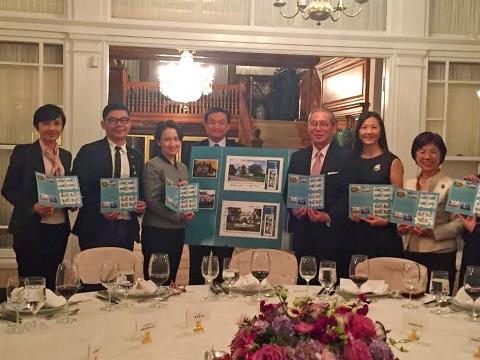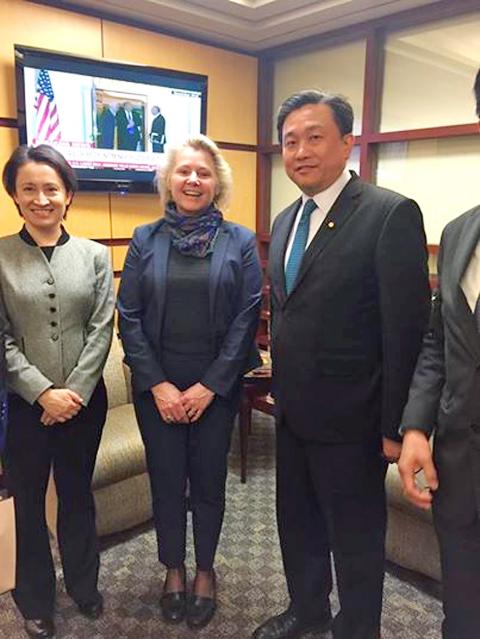A delegation from the Taiwan-USA Inter-Parliamentary Amity Association on Wednesday visited the US Department of State in Washington to meet Principal Deputy Assistant Secretary of East Asian and Pacific Affairs Susan Thornton.
Democratic Progressive Party (DPP) Legislator Wang Ding-yu (王定宇), one of the eight legislators in the delegation, said the meeting signified more stable Taiwan-US relations.
While Taiwanese legislators have visited the State Department individually before, it was the first time they were able to meet senior US officials as a group, Wang said on Wednesday night at the Twin Oaks Estate in Washington.

Photo: Nadia Tsao, Taipei Times
US Secretary of State Rex Tillerson has not yet tapped an official to head the bureau, but there are signs that US President Donald Trump’s government is leaning toward a continuation of policies enacted by former US president Barack Obama’s administration in its second term by gradually changing some guiding principles, which restricted US actions, on certain policies for the potential normalization of relations with Taiwan.
DPP Legislator Hsiao Bi-khim (蕭美琴) said the delegation’s visit focused on issues relating to finance and trade, national security and Taiwan’s participation in global events.
Taiwan is especially concerned if Trump’s Asia-Pacific financial policies would focus on bilateral accords, Hsiao said.

Photo from Wang Ding-yu’s Facebook account
Although Trump’s attitude toward international organizations and multilateral treaties appears to be far different from past US policies, Taiwan should endeavor to win the US’ support for its participation in international events and organizations, she added.
As for Taiwan’s participation in this year’s World Health Assembly, Wang said the Taiwanese delegates had broached the subject with their US counterparts.
The US is concerned and would do its best, but Taiwan must rely on itself, Wang said, adding that while the US is supportive of Taiwan, it must prioritize its own national interests.
Chinese Nationalist Party (KMT) Legislator Johnny Chiang (江啟臣) said that Trump would want to do something different from his predecessor, and would prioritize US benefits and interests, but in the grand scheme of things, he would likely return to pursuing normal relations with a majority of countries.
DPP Legislator Yu Mei-nu (尤美女) said that some Washington hands, citing Japanese Prime Minister Shinzo Abe as an example, said Taiwan could learn from Tokyo by making its own propositions based on the nation’s needs and interests, and should not passively wait for Trump to make a decision.
Earlier on Tuesday, Wang wrote on Facebook that the delegation met US Representative Ed Royce, Republican chairman of the House Committee on Foreign Affairs, and US Representative Ted Yoho, Republican chairman of the House Asia and Pacific Subcommittee, on the second day of their trip.
The delegation talked with the two congressmen on issues concerning ways to boost Taiwan-US links, Wang wrote.
The two US representatives gave positive feedback on Taiwan’s hopes to be one of the first economies to begin talks with the Trump administration on bilateral trade relations, a proposed Taiwan Travel Act and Taiwan’s bid for international participation, Wang wrote.
The delegation also met US Senator Ben Cardin, Democatic member of the Senate Committee on Foreign Relations, and two Republican senators, Steve Daines and Bill Cassidy, Wang said.
“The advantage of interacting with lawmakers is that we can talk about everything. We do not have to avoid sensitive issues,” Chiang wrote on Facebook on Tuesday.
Chiang said they talked about the future of the US’ “one China” policy; US trade strategies and Taiwan-US bilateral trade relations after Washington withdrew from the Trans-Pacific Partnership (TPP) last month; US arms sales to Taiwan; and Taiwan’s pursuit of independence in national defense.
Chiang added that be it in the Senate or House of Representatives, a Republican or a Democrat, most US lawmakers expressed hope for closer cooperation between Taiwan and the US in the areas of trade, economy and security.
The US legislators believe that even without the TPP, Taiwan and the US can continue their trade and economic relationship through a one-on-one channel, he said.
Additional Reporting by CNA

The manufacture of the remaining 28 M1A2T Abrams tanks Taiwan purchased from the US has recently been completed, and they are expected to be delivered within the next one to two months, a source said yesterday. The Ministry of National Defense is arranging cargo ships to transport the tanks to Taiwan as soon as possible, said the source, who is familiar with the matter. The estimated arrival time ranges from late this month to early next month, the source said. The 28 Abrams tanks make up the third and final batch of a total of 108 tanks, valued at about NT$40.5 billion

Two Taiwanese prosecutors were questioned by Chinese security personnel at their hotel during a trip to China’s Henan Province this month, the Mainland Affairs Council (MAC) said yesterday. The officers had personal information on the prosecutors, including “when they were assigned to their posts, their work locations and job titles,” MAC Deputy Minister and spokesman Liang Wen-chieh (梁文傑) said. On top of asking about their agencies and positions, the officers also questioned the prosecutors about the Cross-Strait Joint Crime-Fighting and Judicial Mutual Assistance Agreement, a pact that serves as the framework for Taiwan-China cooperation on combating crime and providing judicial assistance, Liang

A group from the Taiwanese Designers in Australia association yesterday represented Taiwan at the Midsumma Pride March in Melbourne. The march, held in the St. Kilda suburb, is the city’s largest LGBTQIA+ parade and the flagship event of the annual Midsumma Festival. It attracted more than 45,000 spectators who supported the 400 groups and 10,000 marchers that participated this year, the association said. Taiwanese Designers said they organized a team to march for Taiwan this year, joining politicians, government agencies, professionals and community organizations in showing support for LGBTQIA+ people and diverse communities. As the first country in Asia to legalize same-sex

MOTIVES QUESTIONED The PLA considers Xi’s policies toward Taiwan to be driven by personal considerations rather than military assessment, the Epoch Times reports Chinese President Xi Jinping’s (習近平) latest purge of the Chinese People’s Liberation Army (PLA) leadership might have been prompted by the military’s opposition to plans of invading Taiwan, the Epoch Times said. The Chinese military opposes waging war against Taiwan by a large consensus, putting it at odds with Xi’s vision, the Falun Gong-affiliated daily said in a report on Thursday, citing anonymous sources with insight into the PLA’s inner workings. The opposition is not the opinion of a few generals, but a widely shared view among the PLA cadre, the Epoch Times cited them as saying. “Chinese forces know full well that